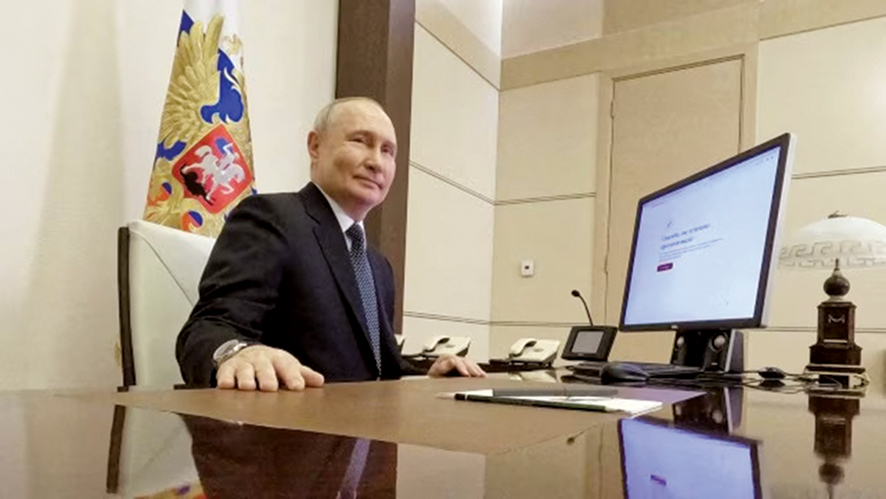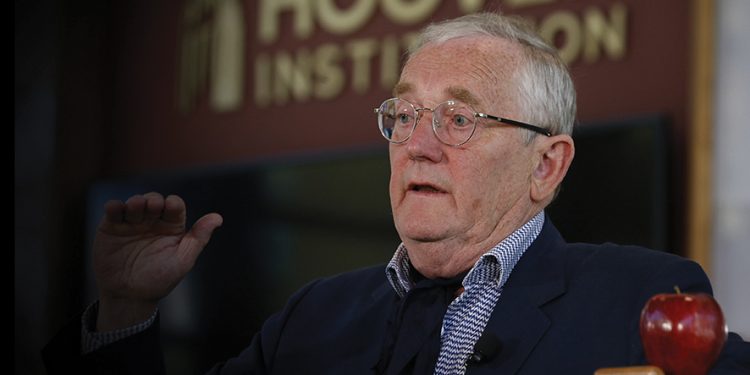Robert Service, one of the UK’s foremost Russian History specialists, biographer of Lenin, Stalin, Trotsky, Tsar Nicholas II, and chronicler of Putin’s first 20 years of rule, sat down with Radio Free Europe/RL’s Georgian Service to talk about the force that is Putin.
You write that Russia’s past is like putty in Putin’s hands – he shapes it as is his wont. But what about its future?
Anybody who tells us that they know what the future is, is a fool. Who could have said in 1916 the future of Russia for the next 70 odd years would lie with the communists?
It’s definitely a more brittle future. The very fact that Putin has manipulated the Constitution and distorted the politics and impose extreme authoritarian rule, and personalized it all to such an extreme degree, means that he is exposing himself to the possibility of different methods being used to get rid of him: An explosion of popular discontent or an eruption of elite discontent, both of these are possibilities created by personalizing his dominance.
What will it take for change to come to Russia? In 2007, Boris Berezovsky said that Russia’s authoritarian regime could be brought to an end only by force. Has time proven him right?
I had lots of disagreements with Berezovski. I don’t think he was a great judge of possibilities. If the war goes badly, then Putin’s undoubtedly in trouble, because he bullied his own security council into accepting the first steps towards that war just a few days before it happened. That’s one possibility. The other possibility is a continuing downturn in the economic situation. Russia has economic difficulties. The concordat between the Russian president and Russian people, since 1991, has always been that the president, through the Duma, guarantees a certain minimal level of welfare, however autocratic. Putin has become, and by golly, has he become autocratic, but he has looked after that minimal level.
Putin is already slipping: geo-strategically, geo-economically, geopolitically
Putin knows how riotous Russians can easily become – I mean, look at the pensioner riots of 2012. He knows what Russians are capable of when they’re pushed to extremes. So, he’s got to keep the economy up to a level sufficient to go on paying off the people on whose votes he depends, whose acquiescence he depends on even more, because votes, of course, are not really a great criterion for reality in Putin’s Russia.

At this rate, when should one expect change in Russia? After Putin dies? And where will this change come from – internally, or from outside?
Well, a lot of the pressure has been exerted already from outside, and it has not yet significantly undermined Putin. I’ve always thought that the main pressure will have to come from inside Russia.
It doesn’t look as if the dominant business elite have got the guts to stand up to him. Going back to 1917, then the business elite did break away from the monarchy. And that was one of the factors that led to the abdication of Nikolai the Second. At the moment, it looks as if they are still gaining enough from the state contracts that Putin is spraying on them in wartime for them not to be tempted to move against him. It would be tricky anyway, because Putin’s Russia is much more controlled than Nikolai the Second’s Russian empire ever was. So it will be difficult for the business elite to turn on him.
And why would the security elite turn on him? Well, that could happen when the war goes badly and somebody has to be the scapegoat. And he’s the readiest scapegoat of all, because he is the prime motivator of this special military operation.
When you say “when the war goes could badly,” should it perhaps be more of a question of “if” the war goes badly?
My own judgment is that, at the moment, we’re in for a protracted stalemate. One of the massive misjudgments that Putin has made is that he could so easily overrun most of Ukraine. He massively underestimated the Ukrainian patriotic spirit and determination. And he might have sacked several FSB officials for supplying him with incorrect ratings of the American or Ukrainian opinion, but it’s his own fault.
This has been the fate of Russians for more than 200 years: It is very difficult for them to rebel
He also made a massive misjudgment about NATO. With the intention of diminishing the outreach of NATO, he’s actually added to the number of countries in the alliance. Geo-strategically, it is a disaster for Russia.
Back to the question of change. When you say that it’s bound to come from inside, who do you have in mind?
At the moment, there’s no obvious candidate, but there are some ruthless, clinical minds in the entourage around Putin, and some surprises could happen. Let’s go back to 1953, when the man who had been judged to be a reliable Stalinist, Lavrentiy Beria, proved to be the most radical of the removers of Stalin’s legacy as soon as he was dead, playing a part in making sure that he didn’t get the medical assistance he needed to live.
So even Nikolai Patrushev might take the clinical view if he sees it’s not working out. At the moment, it seems that he is himself just as much an imperialist fanatic as Putin is. But when your personal security is challenged, you can quickly change your mind.
So it’s about the moment when Putin slips?
Yes. I think he’s slipping, geo-strategically, already. Geo-economically, geopolitically, too. That’s really why he needs to strengthen, as he’s doing, the authoritarian bulwarks of his power. If he was truly confident that no one could move against him, he wouldn’t be acting like this maniac autocrat.
You wrote “The Kremlin Winter,” which analyzed Putin’s first 20 years in power. Wherein lies his power and what’s the secret to his longevity?
Well, I think we have to give it to him that he managed to put forward an ideology of Russian patriotism that struck a chord with most Russians. The public opinion polls can be laughed at, because they obviously exaggerate his popularity, but he did give Russia back its pride. He himself started out as a more respectable political figure than Yeltsin was. He organized patriotic events in his country, he welcomed world football, world motor racing, and other events into Russia. He gave Russians a sense of self pride again, something they’d lost in the decade after the fall of the Soviet Union. I think this should not be underestimated.
We have to give it to him that he managed to put forward an ideology of Russian patriotism that struck a chord with most Russians
While most Russians acquiesce to his power, they prefer to turn a blind eye to the nastiness of the Putin regime if it doesn’t affect them, personally, if they’re not conscripted into the army against their will, nor their sons. Yet, I think there is reason to feel that Russians might decide that self-pride might eventually involve doing without Putin the autocrat. It could happen.
Do people bear responsibility for putting up with dictators?
That’s a really tricky question. What could the Russians have done? I think we have to remember how difficult it would be for them to rebel. This has actually been the fate of Russians for more than 200 years: It is very, very difficult for them to rebel.
Putin has enough of a historical memory; he was trained as a security official; he surrounded himself, especially in the earlier years of his power, in the 2000s, with people he knew from the KGB, and his ideology gradually formed very firm foundations, in the way that security officials normally think about politics. I think that’s got a lot to do with what is happening now.
He might have been a different man if things had turned out differently in the early 2000s. Perhaps the West could have handled them differently, but I rather doubt it. I think that underestimates how much of a KGB mentor mentality he was carrying around while charming Tony Blair and George Bush, Jr. I think it was going to come out sooner or later.
Russians who have stood up to him get removed from politics. He started doing it very, very subtly over a number of years. And he gave Russians a vision of one great Russia, “Make Russia Great Again,” this was without him actually expressing it. And he has militarized the country by stealth.
When Russians do muster up courage and change happens, it is usually followed by dark times – take post-1917 revolution and the 1990s after the perestroika. How does knowledge of that play a role in the Russian mindset?
I’m sure it does. I think most Russians have learned from their parents, or from their grandparents, how awful the situation can become when the lid is pulled off the political system. And I think that Russians have been impregnated with a fear of unleashing the demons of political upheaval. So some minimal degree of stability in the country is baked into the mentality of the Russian people. And you can see why. It’s not because Russians are some zoological freak phenomena; it’s because they’ve been through what they’ve been through. Russians have had a very raw deal from their history.
Interview by Vazha Tavberidze














